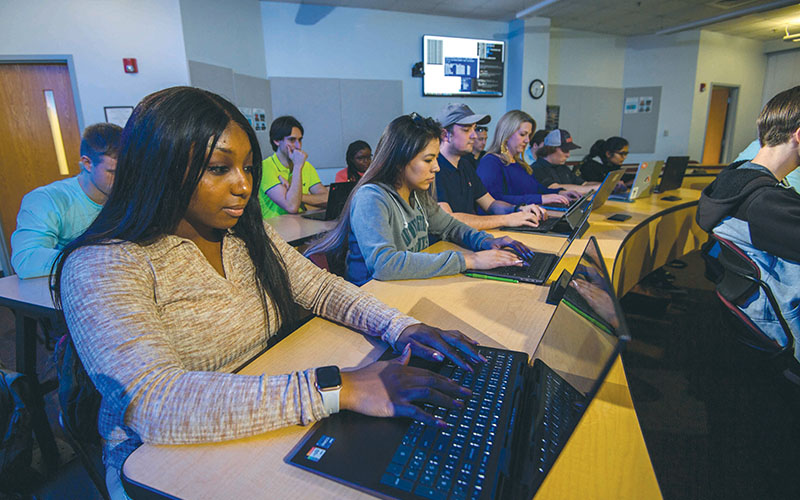University of North Carolina Wilmington developed a self-sustaining ecosystem among its computer science and business schools, said Ulku Clark, director of the school’s Center for Cyber Defense Education.
It started almost 20 years ago when Clark entered a group of students into a cyberdefense competition. The first year was a “learning experience,” she said, but the students were able to take home second place the following year in 2006.
The cyberdefense club now has about 30 students attending its weekly meetings and regularly competes in competitions. The student organization provided momentum to UNCW’s cyberdefense program. A cybersecurity minor was later established, securing National Security Agency (NSA) and Center for Academic Excellence in Cybersecurity (CAE) designations.
A shortage of cybersecurity professionals influenced Clark and her team to slowly evolve UNCW’s offerings to now include eight cybersecurity programs for both undergraduate and graduate students.
Regardless of their major, students have chosen to take the Introduction to Cybersecurity class, Clark said. The minor and bachelor’s degree in cybersecurity are the only programs that require students to take the class, which would fill about four sections, she said. Each semester, the university fills at least six sections.
“And after they take that course,” Clark said, “they either add [cybersecurity] as a minor, some change their major.”
UNCW established the first cybersecurity bachelor’s degree in the state, said Ron Vetter, dean of UNCW’s College of Science and Engineering.
Clark and Vetter anticipated 120 students would graduate with a cybersecurity major over four years, with the first graduate receiving the degree last spring, four graduating last semester and the expectation of 60 students graduating this spring. The actual number of expected graduates with degrees in cybersecurity this spring is 165, Clark said.
The cybersecurity major is a collaborative effort between the Cameron School of Business and the College of Science and Engineering, Vetter said.
“It’s managerial, its policy, its risk management and it’s also technical,” Vetter said. “And I think for the students, getting both perspectives is going to make our program really strong.”
The shortage of cybersecurity professionals is a national security issue, Clark said. The national workforce status is about 600,000 open cyberdefense jobs – the shortage in North Carolina is about 25,000 open jobs, she said.
Ten years ago, finding local professionals with cybersecurity experience was a challenge, and getting those with the necessary experience to move to Wilmington for a cybersecurity job was difficult, said Thomas Hill who currently serves as nCino’s chief information security officer.
Hill joined UNCW’s Cybersecurity Advisory Board and said he recommends additions to the university’s curriculum.
While he said nCino has an easier time finding qualified students to fill entry-level positions now, the shortage is still prevalent among senior-level jobs. Academic study is great, he said, but taking a couple of cybersecurity classes does not make a security expert.
“There’s more of a lack of experienced individuals in the marketplace that can fill those positions, but many organizations like my own have come to terms with that,” he said. “And instead of assuming that we’re not going to find anyone, we take entry-level folks and put them in roles where we know we can groom them to gain that experience over time.”
Now that companies across industries are adding artificial intelligence to their offerings as a marketing tactic, regardless of experience in technology or cyberdefense, it opens more opportunities for cybercrime for both the company and the customer, Hill said.
Vetter and Clark are working to create graduate certificates.
“Cybersecurity is something that, health care needs it, banking needs it, every industry needs it,” Hill said.
Vetter and Robert Burrus, dean of the Cameron School of Business, agreed to create a 40,000-square-foot cyber center adjacent to Cameron Hall, where students can experience a cyberattack simulation environment. He expects the project to be completed in three years, he said.



